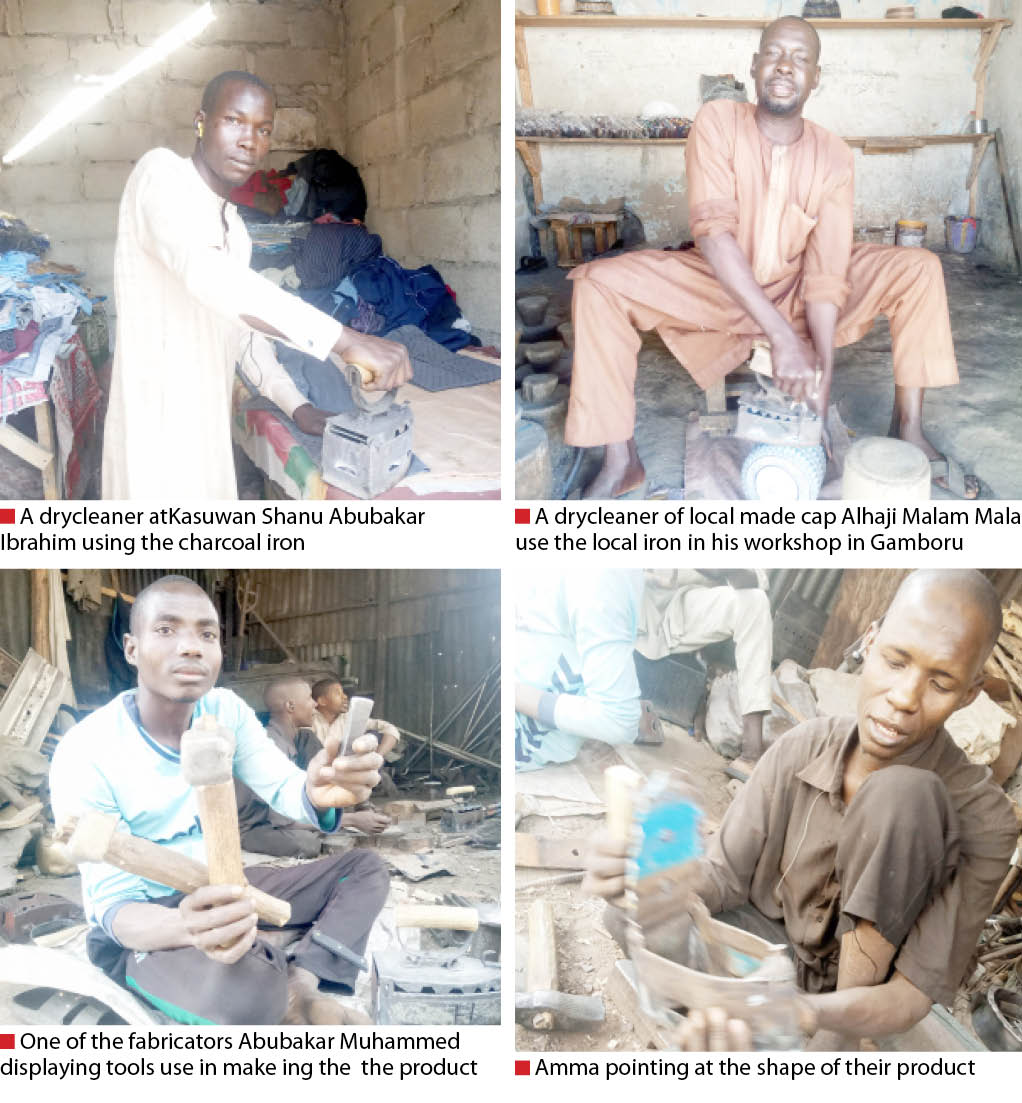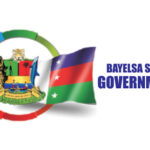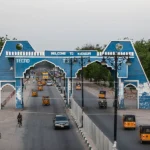Local blacksmiths who ply their trade at the Makera site of Gamboru Market in Maiduguri are happy to be back to doing what they know how best to do. At the moment, fabricating locally made pressing iron and some other tools is their preoccupation, following the restoration of peace in the state.
Investigations have indicated that the over 10 years of insecurity associated with Boko Haram insurgency unsettled blacksmithing activities in Maiduguri, forcing many to seek other means of livelihoods, but the one-year power outage in the town due to the destruction of facilities and major power lines into the city by insurgents has spurred them to take advantage of the situation to fabricate charcoal iron. This has boosted its market and job opportunities for youths in Maiduguri.
- FG threatens to prosecute Nigerians bribing immigration officers for passports
- Amidst fuel scarcity, Nigerians decry widespread power outage
Residents of Maiduguri, especially local drycleaners, tailors, students, mothers, among others, have all embraced the use of the local charcoal iron for pressing of clothes due to the lingering power outage.
A blacksmith, Ali Amma, who is one of the fabricators of the charcoal iron at Makera Gamboru Market, said the initiative has become a saving grace for residents and source of income for many young men at the Makera workshop, especially apprentices learning different skills.
Amma said, “I started fabrication of the charcoal iron not more than two years ago and we use to produce one or two at the beginning but the electricity outage in Maiduguri stimulated the demand for the charcoal iron as alternative to the electric irons. They started buying the foreign made charcoal iron which does not give the maximum heat coupled with the issue of durability, as well as high cost of the foreign product. Now, the people have a replacement and they have dumped the foreign one.
“People in Maiduguri began to use the Makera charcoal iron based on its durability and affordability. The locally made one costs N3,500 compared to the foreign one at N7,500 for a medium sized one. This is part of what motivates us to continue the production. We have about five different sizes from smallest to the biggest size which costs N10,000 each while the smallest size is N2,000 but majority of the people prefer the medium size which is sold for N3,500 each,” Amma said.
Amma said in a day, he can construct about two to three irons depending on the availability of the metal plate. “We use 2mm of Chaka metal plate for the body and 4mm metal plate for the layer part of the iron, then we put a timber stick for the handle as well as nuts to join the body parts. For the cover of the iron, we use 2mm and a tick wire which we bend to hook where the cover can open and close.
“To be frank with you, I have made a lot of fortune from the construction of locally made charcoal iron because it was from the proceed that I married my wife. At the peak of the Boko Haram insurgence in Maiduguri, we went through untold hardships which compelled us to think of how to weather the storm. And with the restoration of peace in Maiduguri, Alhamdulillah, life has returned to the city and we are using our talent to recuperate by fabricating various things to boost our income.
“For now, the demand for the iron is high because even if you construct 1,000 pieces, there are people waiting to buy. The ones you see here are pieces ordered by some residents. We have a customer from Niger Republic who bought one of the irons and after two weeks, called and ordered for 30 pieces. We have a customer from Chad Republic who also bought three pieces but had later asked my colleague to construct 20 more.”
Another fabricator, 30-year-old Abubakar Muhammad, said the power outage in Maiduguri has become an opportunity for young metal fabricators to make brisk business. “What motivated me to join in the construction of pressing iron is the high demand for the locally made product as a result of power outage in Maiduguri which has lingered for more than a year.
“Our products are strong and durable because we use strong metal.
“The idea to construct locally made iron was born from the frequent repair of the foreign made charcoal iron. People often brought their irons for repairs of the handle or cover in Makera. We felt that if we can repair them, we can equally fabricate same, especially since the demand for the iron has risen due to power outage.
Muhammad explained, “We studied the composition and components of the foreign charcoal iron and discovered that we can even fabricate better and stronger charcoal iron with the metal plate. When we started producing our own, people patronized it and after a while the power outage increase the demand and we continued the production of the product which has attracted customers not only from Borno but from neighbouring states and countries sharing borders with Borno like Republic of Chad, Niger Republic and Cameron.”
Muhammad also revealed that the charcoal iron has restored their dwindling fortune caused by insecurity. “We are grateful to Allah for the peace in Maiduguri and we are happy that the business is going smoothly and there is stable income to cater for food and other basic necessities of our families. We are also training young men on the skills to becoming self reliant.
“We are going to widen our horizons to fabricate other products that have direct bearings to the ordinary people,” Muhammad said.
Another fabricator, Musa Ibrahim, further revealed that they have a market for the old and dislodged foreign-made charcoal irons. “When we get the old ones, we still buy scrap and repair them for interested buyers but the major market we are enjoying presently is the locally made charcoal iron which customers from different northern states, especially drycleaners, patronize. We thank God for the opportunity because it has provided jobs and personal income for many young people who we trained on how to construct the product.”
A local drycleaner at Kasuwan Shanu area of Maiduguri, Abubakar Ibrahim, said the Makera charcoal iron has become a great relief to them. “We usually use electric pressing iron but when the electricity went off for more than one year, we embraced the foreign charcoal iron which unfortunately, isn’t durable and did not give us the maximum heat needed for pressing clothes. When they invented the locally made iron, we discovered that they were stronger and provide the maximum heat because it contains more charcoal and the metal absorb more heat than the foreign iron.
“Before the power outage, we use it whenever we witness power fluctuations and the price then for the minimum size was N1,500 but now, because of the power outage, the price has skyrocketed to N3,500. However, despite the hike in price, we prefer it because the metal plate helps in providing the needed heat unlike the foreign ones made of cast iron. Tailors have also started using the locally made charcoal iron in their shops,” Ibrahim said.
A drycleaner of locally made caps (zanna), Alhaji Malam Mala, said “We are happy because apart from the quality of the iron, it also affordable and has been helping us stay in business.
“I used the foreign charcoal iron for many years but the recent innovation of our blacksmiths has brought new development because their product is better and stronger than the foreign charcoal iron. One thing that excites me with the initiative is that it is a sign of development from blacksmiths. If government can support the skills of our youth in areas such as this, then definitely the sky will be our limit,” Mala said.
A resident of Gamboru Kasuwan Shanu, Bakari Mohammed, told Daily Trust Saturday that the Makera-made charcoal iron has become a household brand in some parts of Maiduguri.
“The long power outage has created room for alternative source of ironing clothes and luckily our blacksmiths rescued the situation by providing affordable charcoal iron which is serving the purpose well.”

 Join Daily Trust WhatsApp Community For Quick Access To News and Happenings Around You.
Join Daily Trust WhatsApp Community For Quick Access To News and Happenings Around You.

